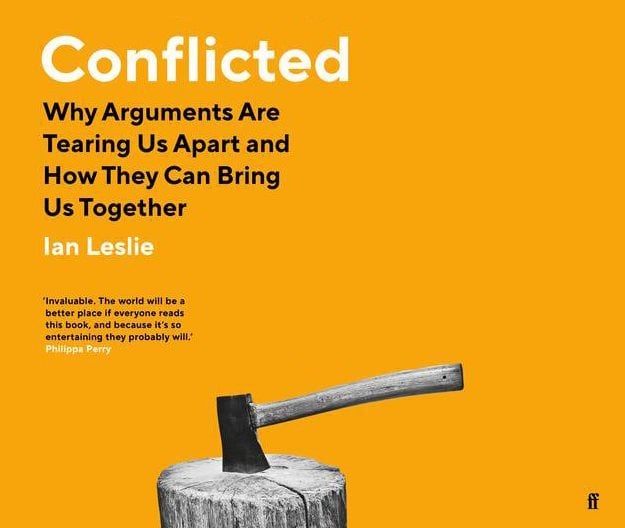#PulpNonFiction: Conflicted

I’ve recently been reading up on conflict, argument and negotiation (important skills for surviving the age of social media). To that end, I’ve just finished Ian Leslie’s Conflicted. It’s a short book, but it’s packed with pertinent quotable sentiments and practical case studies on not just how to argue better, but why (productive) lively argument actually makes interpersonal relationships, businesses and societies better, richer and stronger.
I highly recommend you read the book, however, instead of going into Leslie’s tips on how to argue better (as good as they are), I want to get into a particular argument that has been playing on my mind lately; what happens when your personal values come into conflict with the figurative social credit or more literal financial wellbeing of your family, colleagues, or investors?
What happens when you have to choose between your personal ethics and your partner’s profits?
Or, to put it another way, if your deeply held personal ethics conflict with the the Overton Window, that is the general socially acceptable zeitgeist and as such bring yourself - and by association with you, your friends family and business associates - into risk of being “cancelled” by an outrage mob or social interest group, should you compromise on your core values by lies of omission or lies of commission in order to protect the people around you?
Which is more important - loyalty to yourself, in standing up for what you believe strongly is right or wrong, or loyalty to your blood and business ties?
This is not mere speculation, it’s a position all too many public figures and business leaders found themselves in - a position where they have been forced to put a price on their values.
A real-life example
A current case study illustrates this point. Winston Marshall of the band Mumford and Sons, recently left the band after he got caught up in a culture war that threatened to tarnish the reputation (and livelihood) of his band mates due to their association with him. This would happen as long as he refused to adjust his beliefs to accommodate the demands of the crowd.
In his own words:
“For me to speak about what I’ve learnt to be such a controversial issue will inevitably bring my bandmates more trouble. My love, loyalty and accountability to them cannot permit that. I could remain and continue to self-censor but it will erode my sense of integrity. Gnaw my conscience. I’ve already felt that beginning. The only way forward for me is to leave the band. I hope in distancing myself from them I am able to speak my mind without them suffering the consequences. I leave with love in my heart and I wish those three boys nothing but the best.”
You can read his full letter here. Regardless of your opinion on his political views, the letter is a thought provoking example of how uncomfortable conflict, once brought into the open, can start new conversations that could in turn lead to deeper growth and reconciliation. This, instead of simply papering over differences and pretending to believe things we don’t believe for the sake of getting along and not rocking the boat.
By leaving the band, Marshall showed that true integrity as a leader means paying the price for your values yourself and by yourself alone. He understood that the costs of his values were not costs that he could (or should) pass along to his bandmates to bear with him. By severing his ties, he was able to live with himself and spare his colleagues from sharing in his “punishment”.
This is true leadership; not choosing between loyalty or integrity, but deciding to own them both and take the costs of carrying them onto your own shoulders. Business and political leaders would do well to follow this example. Sometimes the best way to deal with conflict is to walk into it, knowing the cost and knowing that it is a price worth paying.
Which brings us back (via a rather roundabout route) to the quote I opened with. I don’t know about you, but I would like to live in a world where public (and private) figures do not have to choose between personal integrity and group loyalty. Like Roger Williams, I’d like to live in a society where lively debate is encouraged and where no one feels the need to self censor to protect themselves or their partner’s profits. Right now, we do not live in that world. For that reason, I am grateful for every leader who is bold and brave enough to pay the price for standing up for what they believe in on our behalf.































